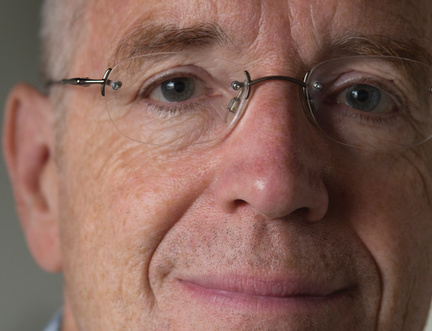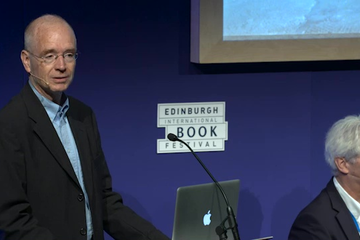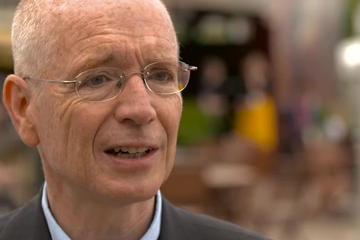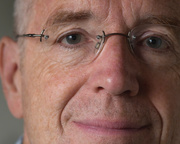State of Truth
By Rory MacLean

In 2018, we commissioned 51 authors from 25 countries to write essays exploring ideas about freedom for The Freedom Papers, a publication produced in partnership with Gutter Magazine. Read on for Rory MacLean's essay, and visit guttermag.co.uk to purchase a copy of The Freedom Papers.
At dawn the curtain rises on an empty stage. Actors stand poised in the dark. Dancers and singers wait in the wings for their cue. Musicians hold their instruments to their lips and bodies, at the ready, ever ready for the nod of the director, waiting for the show to begin.
In North Korea every scene of life has been scripted, every public performance rehearsed, every political proclamation calculated to convince and coerce. Its 25 million people live in a kind of national theatre, cast in the role of players and audience alike, as well as those of choreographers, prompters and stage managers. On the spotless streets of the capital Pyongyang and the pine-fringed beaches of Wonsan, from the bustling canteen at the elite Kim Chaek University to the silent soup queues at Kaechon Penal Labour Camp 14, North Koreans act out their lives as if on a stage, tailoring their performance for partners, neighbours, co-workers and political commissars, knowing that their every move is watched.
North Korea – officially called the Democratic People's Republic of Korea – began its existence in 1948 as a bold experiment in social engineering. Its leaders wanted people to subvert their individual will to that of the collective, so as to reshape human nature. From the earliest days public forums where individuals could debate and share personal thoughts, and learn to trust their own experience, were eliminated. Truth came to be manufactured by the state for the people, without integrity, for it excluded the individual heart. All means of self-expression – even love and familial loyalty – were cultivated and shaped for political ends, trapping every man and woman in an unending charade, damning them to repeat their performance again and again. Any digression from the script could lead to the dissenter and his family being blacklisted for as long as three generations. The iniquitous, feudal-like Sŏngbun caste system still classifies citizens into 51 categories and three main groups: hostile, neutral or loyal.
As a result, conformity came to be prized above all. Belief became ingrained because of the power of fear. Hence for seven decades no novel has been published that sprang from a private passion. No painter has produced a work that didn't adhere to the Party line. Worst of all, once every week every man, woman and schoolchild in the country must write a page in their Self-Criticism Dairy. Two-thirds of the entry must criticise their own shortcomings, for example that they were late for their factory shift or did not volunteer their labour with full heart. The other third is to be used to criticise the failings of a classmate, colleague or neighbour.
‘She did not stand tall for the singing of ‘Where Are You, Dear General’?’
‘He did not use the prescribed white cloth to dust the portrait of Our Great Leader.’
‘She told me that she is always hungry…’
A supervisor, teacher or inminban leader, the warden whose duty is to know everything about all the residents of a building or neighbourhood, then checks the diaries. Details of misdeeds are passed on to the police or – if especially notable – to the Ministry for the Protection of State Security. After 70 years of the nation's existence, without the possibility of ever leaving the stage, North Korea’s players can only accept the performance to be reality.
Mansu Hill – mansu means ‘long life’ – is North Korea’s most sacred site. On its heights overlooking Pyongyang, school classes gather on graduation, newlyweds bow on their wedding day and workers pay their respects on the anniversary of the foundation of their factory or farm. In their thousands, they mount the wide open steps to kowtow before the towering bronze statues of Kim Il-sung and his son Kim Jong-il. On either side of them stretches a sweeping frieze that recounts, in high relief, heroic tales of the struggle against the Japanese occupation and the creation of the nation. ‘Everyone in the world thinks we are forced to love our leaders,’ a woman said to me there. ‘The truth is, I have loved to come here since my childhood.’
To us truth is more than a convincing performance. It is more than a fixed idea or a way of perceiving reality. Truth is spontaneous, fluid and organic. It is integrity, a trust in both society and self, in the collective as well as in the individual conscience, intellect and heart.
But in North Korea truth has become an act. Children are indoctrinated in the state-sponsored fiction from the earliest age, sent to government nurseries for up to 14 hours per day before they are 6 months old. As they grow up, Young Pioneers are obliged to collect daily stamps to ‘prove’ their loyalty. Youth League members must attend mass rallies. Spies report citizens who perform with insufficient sincerity. And at the latest glittering international gathering and the Spring Friendship Art Festival, the regime now seizes the narrative for the whole Korean peninsula, its people crying out their support for the show’s supreme director on cue.
North Korea’s constitution guarantees its citizens ‘freedom of speech, press, assembly, demonstration and association’. Yet no one would dare tell the truth about the famine that killed hundreds of thousands between 1993 and 2000. No citizen would draw attention to the 2014 United Nations report on the ‘systematic and unparalleled’ abuse of human rights or the compelling evidence of ongoing torture, execution and arbitrary imprisonment in the country’s prison camps (which are said to exist for people to ‘improve their mentality and look back on their wrongdoings and be reformed through labour’ according to a North Korean diplomat at the UN). These brutal, inconvenient truths have been cut from the script.
Freedom cannot exist without truth. But in the world’s most controlled society, people believe what they have always been told. Their truth is dictated from above, trickling down the command structure to the individual actors. No one can doubt the truth of the state, or their freedom to play their role in the all-encompassing national theatre, with all their hearts.
Copyright © 2018, Rory MacLean. All rights reserved.
Supported by the Scottish Government’s Edinburgh Festivals Expo Fund through Creative Scotland.




 Major new partnership with Celtic Connections
Major new partnership with Celtic Connections 

